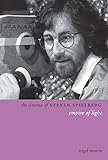The Cinema of Steven Spielberg : Empire of Light / Nigel Morris.
Material type: TextSeries: Directors' CutsPublisher: New York, NY : Columbia University Press, [2007]Copyright date: ©2007Description: 1 online resource (224 p.)Content type:
TextSeries: Directors' CutsPublisher: New York, NY : Columbia University Press, [2007]Copyright date: ©2007Description: 1 online resource (224 p.)Content type: - 9781904764885
- 9780231503457
- 791.430233092
- online - DeGruyter
- Issued also in print.
| Item type | Current library | Call number | URL | Status | Notes | Barcode | |
|---|---|---|---|---|---|---|---|
 eBook
eBook
|
Biblioteca "Angelicum" Pont. Univ. S.Tommaso d'Aquino Nuvola online | online - DeGruyter (Browse shelf(Opens below)) | Online access | Not for loan (Accesso limitato) | Accesso per gli utenti autorizzati / Access for authorized users | (dgr)9780231503457 |
Frontmatter -- Contents -- Acknowledgements -- Introduction: the Critical Context -- 1. Close Encounters of the Third Kind: tripping the light fantastic -- 2. Duel: the descent of Mann -- 3. The Sugarland Express : a light comedy? -- 4. Jaws: searching the depths -- 5. 1941: war on Hollywood -- 6. Raiders of the Lost Ark: lights, camera, action -- 7. E.T. The Extra-Terrestrial: turn on your love light -- 8. Twilight Zone: The Movie: magic lantern man overshadowed -- 9. Indiana Jones and the Temple of Doom: anything goes -- 10. The Color Purple: sisters and brothers -- 11. Empire of the Sun: shanghai showmanship -- 12. Indiana Jones and the Last Crusade: cut to the chase -- 13. Always: light my fire -- 14. Hook: an awfully big Pan(a)vision adventure -- 15. Jurassic Park: another monster hit -- 16. Schindler's List: darkness visible -- 17. The Lost World: Jurassic Park: more digital manipulation -- 18. Amistad: black and white in colour -- 19. Saving Private Ryan: Hollywood on war -- 20. A.I. Artificial Intelligence: eyes wide open -- 21. Minority Report: through a glass, darkly -- 22. Catch Me If You Can: captured on celluloid -- 23. The Terminal: all that jazz -- 24. War of the Worlds: rays in the mirror -- 25. Munich: bitter fruit on the olive branch -- 26. Audiences, subjectivity and pleasure -- Bibliography -- Index
restricted access online access with authorization star
http://purl.org/coar/access_right/c_16ec
Cinema's most successful director is a commercial and cultural force demanding serious consideration. Not just triumphant marketing, this international popularity is partly a function of the movies themselves. Polarised critical attitudes largely overlook this, and evidence either unquestioning adulation or vilificationoften vitriolicfor epitomising contemporary Hollywood. Detailed textual analyses reveal that alongside conventional commercial appeal, Spielberg's movies function consistently as a self-reflexive commentary on cinema. Rather than straightforwardly consumed realism or fantasy, they invite divergent readings and self-conscious spectatorship which contradict assumptions about their ideological tendencies. Exercising powerful emotional appeal, their ambiguities are profitably advantageous in maximising audiences and generating media attention.
Issued also in print.
Mode of access: Internet via World Wide Web.
In English.
Description based on online resource; title from PDF title page (publisher's Web site, viewed 02. Mrz 2022)


